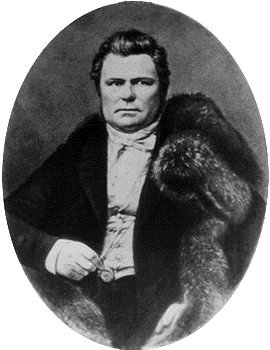(1801-1872)

Immanuel Nobel
Father of Alfred Nobel. Self-taught inventor and building contractor in Stockholm.
Immanuel Nobel grew up in a poor family who could not afford any formal education. His father taught him how to read and write. At the age of 14 he became a sailor. Exactly what Immanuel did after his return to Sweden at the age of 18 is not clear but somehow he got into the building industry.
After going bankrupt in 1833 he found it difficult to start a new business in Sweden. A few years later he left Sweden, going first to Finland, and then to St. Petersburg, Russia. There, he started a small mechanical workshop which soon expanded because of orders for military equipment from the Russian army.
He developed naval mines which played a role in the defense of Sveaborg (near Helsinki) and Kronstadt (near St. Petersburg) during the Crimean war of 1853-1856. Immanuel Nobel also invented machine tools for the mechanical industry and a system for central heating of buildings with radiators and hot water.
At the end of the Crimean war his financial situation again became critical. The creditors appointed his son Ludvig as a director of the family enterprise and Immanuel Nobel, his wife, and two of the sons returned to Stockholm to start a new life. Working with his sons, Alfred and Emil, he started experimenting with nitroglycerine. An explosion on September 3, 1864, killed Emil and several other persons.
Immanuel Nobel took this very seriously. Shortly after the explosion he had a stroke from which he never fully recovered. In spite of this family tragedy Alfred continued the work. During his active career Immanuel Nobel was a talented inventor but on several occasions he got involved in unrealistic projects without having the proper financial backing.
